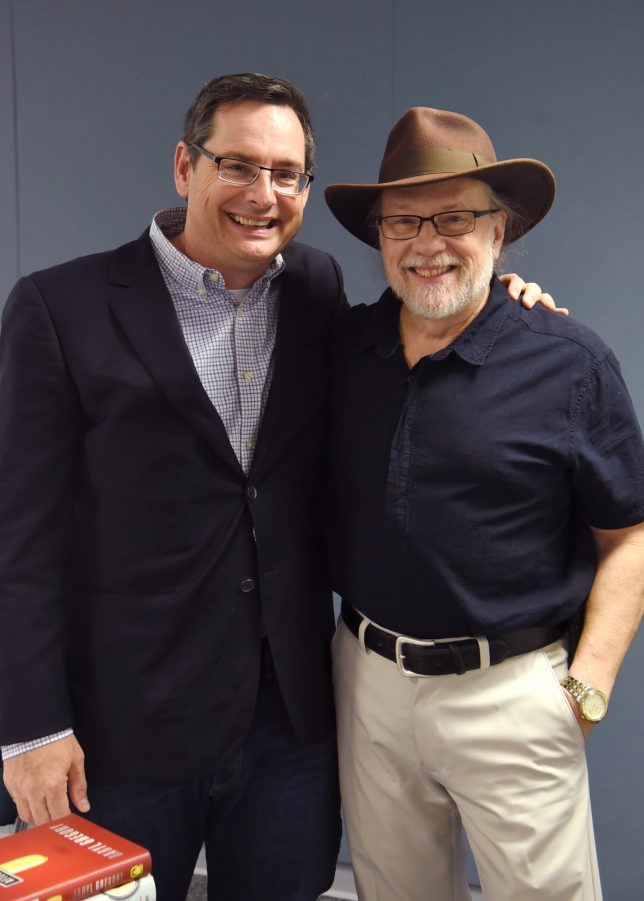Later I’ll post my favorite posts of the year. For now, it’s too damn cold in my office for that kind of cut-and-paste indulgence.
So let me just wax nostalgic about the year just past.
The things I love are still with me. Top of the list, Donna. We’ve been moving through some changes, dealing with stuff and nonsense, and have finally gotten to a place where life can be simply enjoyed again, rather than wrestled with.
Coffey is still full of puppy-ish enthusiasm. Slower, certainly, but for a 13-year-old dog remarkably spry. No arthritis or other impediments. She sleeps a bit more. Of course, some of this is stored energy from being by herself a goodly chunk of most days while the humans are at work. Coffey is a joy.
My friends are all reasonably well.
I have a good job. Some new faces came this year and we had a great year. Our first (annual) book festival came off magnificently and this year’s will be even better. I’ve settled, more or less, into my role as consignment buyer. Despite every intention to the contrary, I have become an acquisitions editor. It has been an education. I have been very pleasantly surprised by some of the books I’ve gotten for the store. I’ve also learned quite a bit about that world and the reasons behind the choices made.
I finished a new novel and turned it in to my agent in July. We wait. I think it may be the best thing I’ve ever done—it is certainly different than anything I’ve ever done, written at a level I don’t think I’ve ever achieved before. Of course, once again, I think I’ve written something that has no real category, is a bit off from the expected. My agent has been tremendous in her support.
I’m now working on the third book of my alternate history trilogy, which has taken far longer and traveled some much stranger roads than I expected. Once more I’m immersed in the Napoleonic Era, trying to get as many things “right” as I can. This is all but a straight historical in many ways. I’ve had some surprises with this one, in my research, but I will be glad to finish. Maybe a couple more months and I’ll have the first draft done.
After that I have some decisions to make. If things don’t change…
This is the first year in a long, long time that I’ve chosen to make resolutions. No, I won’t tell you what they are. I don’t need anyone else’s expectations to live up to, this will be hard enough. But check here in the next few months for an update on at least one of my decisions. We’ll see if I can pull it off.
I may be facing a hard time this year. My dad is not doing well. I’ll leave that as it stands for now.
I managed to get through 51 books this year, cover to cover. I’ll do a post about those over on the Proximal Eye in the next few weeks.
Healthwise, I seem to be doing okay. I’m more tired than I like, but everything works, and the other day at the gym some young guy guessed my age at 52. Heh. If I can be mistaken for 62 when I’m pushing 80 I will be pleased.
I don’t know if I’ve become more stoic and accepting of how things are or if I’m just too tired to give the same damn that I once did. Almost nothing has gone according to plan, which is to be expected, but enough went close enough to be a source of mixed satisfaction and frustration. One thing this past year that caused me to reassess my attitude came from a former coworker, a young writer whose first novel was released to considerable acclaim and a degree of commercial success I frankly envy. Talking about it, though, she suggested that she hoped to be as successful as I am. This baffled me. I do not consider myself successful at all. “How do you figure that?” I asked. “You have 12 books out,” she said. “Yeah, but they didn’t do very well.” “You have 12 books out.”
That was it. I had sustained a publishing career long enough and well enough to have put out a body of work she thought admirable. It forced me to reassess my own standards. What do I mean by success? I’d fallen into the usual, equating it with money. Well, that certainly is one measure of success, but not the only one.
I’d always aimed for the condition of sustaining myself materially by the work—that since what I wanted to do was to write, then the writing had to pay the bills. I never reached that point. Came close, but it has slipped further and further away from that moment. I’d gotten into the habit of thinking myself a failure.
But there are other metrics, and my coworker confronted me with one, and I realized that rejecting her assessment would have been cruel. To her, certainly, but to myself as well.
I’m still working through all the implications of that. I still want to be able to write for a living, but it has, for now, become less an issue.
With that in mind, 2018 awaits.
Of course we are now living in a shit show nationally. All the fights waged in youth seem in need to fighting again. I’ve been vocal here about that and will continue to be. But the fact is, I am a lucky, lucky man. I have so much, from great people, and I’ve had and will continue to have opportunities to do more. So many people never get the chance.
So may the coming year offer for us all the chance to realize the good life can hold and let us all have some of it. And be aware of what is good. And that we’ve experienced it.
Travel well, travel far.








